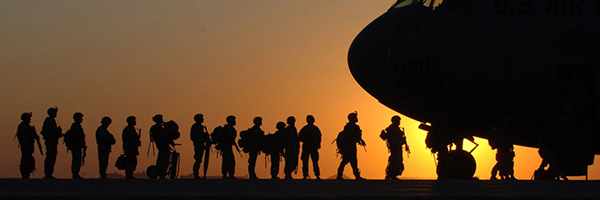Costs of the 20-year war on terror: $8 trillion and 900,000 deaths
 Costs of War Project, Brown University — A report from the Costs of War project at Brown University revealed that 20 years of post-9/11 wars have cost the U.S. an estimated $8 trillion and have killed more than 900,000 people.
Costs of War Project, Brown University — A report from the Costs of War project at Brown University revealed that 20 years of post-9/11 wars have cost the U.S. an estimated $8 trillion and have killed more than 900,000 people.
PROVIDENCE, R.I. [Brown University] — Nearly 20 years after the United States’ invasion of Afghanistan, the cost of its global war on terror stands at $8 trillion and 900,000 deaths, according to a new report from the Costs of War project at Brown University.
The Costs of War project, founded more than a decade ago at the Watson Institute for International and Public Affairs and co-directed by two Brown scholars, released its influential annual report ahead of the 20th anniversary of the 9/11 terrorist attacks in New York City, Washington, D.C., and Pennsylvania, the impetus for an ongoing American effort to root out terrorism in the Middle East and beyond.

“The war has been long and complex and horrific and unsuccessful… and the war continues in over 80 countries,” said Catherine Lutz, co-director of Costs of War and a professor of international and public affairs at Brown, during a virtual event hosted by the Watson Institute on Wednesday, Sept. 1. “The Pentagon and the U.S. military have now absorbed the great majority of the federal discretionary budget, and most people don’t know that. Our task, now and in future years, is to educate the public on the ways in which we fund those wars and the scale of that funding.”
The research team’s $8 trillion estimate accounts for all direct costs of the country’s post-9/11 wars, including Department of Defense Overseas Contingency Operations funding; State Department war expenditures and counterterror war-related costs, including war-related increases to the Pentagon’s base budget; care for veterans to date and in the future; Department of Homeland Security spending; and interest payments on borrowing for these wars. The total includes funds that the Biden administration requested in May 2021.
The death toll, standing at an estimated 897,000 to 929,000, includes U.S. military members, allied fighters, opposition fighters, civilians, journalists and humanitarian aid workers who were killed as a direct result of war, whether by bombs, bullets or fire. It does not, the researchers noted, include the many indirect deaths the war on terror has caused by way of disease, displacement and loss of access to food or clean drinking water.
“The deaths we tallied are likely a vast undercount of the true toll these wars have taken on human life,” said Neta Crawford, a co-founder of the project and a professor of political science at Boston University. “It’s critical we properly account for the vast and varied consequences of the many U.S. wars and counterterror operations since 9/11, as we pause and reflect on all of the lives lost.”
“ Twenty years from now, we’ll still be reckoning with the high societal costs of the Afghanistan and Iraq wars — long after U.S. forces are gone. ”
The report comes at the end of a contentious U.S. withdrawal from Afghanistan, where Taliban insurgents captured every major city and seized governmental control as American military units worked to extract 123,000 troops, diplomats and allies. Of the $8 trillion, $2.3 trillion is attributed to the Afghanistan/Pakistan war zone, according to the report.
In an address to the nation on Tuesday, Aug. 31, President Joe Biden cited Costs of War estimates to convey the financial and human burden of the 20-year war in Afghanistan as he defended his decision to withdraw from the country.
“We no longer had a clear purpose in an open-ended mission in Afghanistan,” Biden said. “After more than $2 trillion spent in Afghanistan, costs that Brown University researchers estimated would be over $300 million a day for 20 years — yes, the American people should hear this… what have we lost as a consequence, in terms of opportunities? …I refuse to send America’s sons and daughters to fight a war that should have ended long ago.”
Even as the U.S. exits Afghanistan, Costs of War estimates show that Americans are far from done paying the bill on the war on terror, which continues across multiple continents. The cumulative cost of military intervention in the Iraq/Syria war zone has risen to $2.1 trillion since 9/11, and about $355 billion more has funded military presence in other countries, including Somalia and a handful of African countries.
And when the wars do end, the costs of war will continue to rise, the report notes: A towering $2.2 trillion of the estimated financial total accounts for future care that has already been set aside for military veterans, the researchers said, and the U.S. and other countries could pay the cost of environmental damage wrought by the wars for generations to come.
“What have we truly accomplished in 20 years of post-9/11 wars and at what price?” said Stephanie Savell, co-director of the Costs of War Project and a senior research associate at the Watson Institute. “Twenty years from now, we’ll still be reckoning with the high societal costs of the Afghanistan and Iraq wars — long after U.S. forces are gone.”
The Watson Institute’s virtual event included commentary from multiple researchers associated with the Costs of War Project, U.S. Sen. Jack Reed, D-R.I., and U.S. Reps. Barbara Lee, D-Calif., David Cicilline, D-R.I., and Ro Khanna, D-Calif. It was moderated by Murtaza Hussain, a national security reporter at the Intercept.
